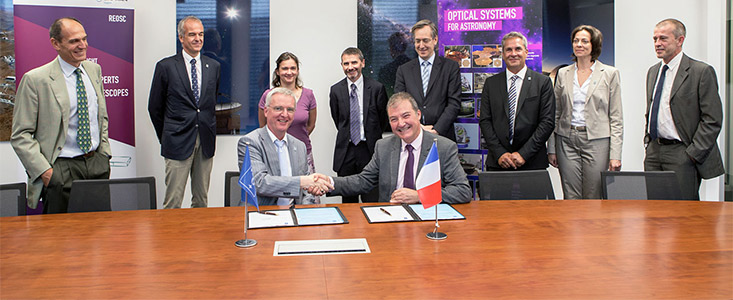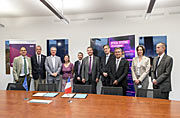Mitteilung
Die ESO unterzeichnet den Vertrag für die deformierbaren Schalenpiegel des E-ELT
8. Juli 2015
Die ESO hat einen Vertrag mit der französischen Optikfirma Reosc unterzeichnet, einer Tochtergesellschaft von Sagem aus der Safran-Gruppe. Diese wird die deformierbaren Schalenspiegel für den vierten Spiegel (M4) des European Extremely Large Telescope (E-ELT) fertigen. Die Spiegel werden in der adaptiven Spiegeleinheit (ann15045) so montiert und eingesetzt, dass sie die bisher größte adaptive Spiegeleinheit bilden.
Der Vertrag wurde am 8. Juli 2015 im ESO-Hauptsitz von Vertretern von Reosc und der ESO feierlich unterzeichnet.
Das deformierbare M4-Spiegelsystem ist ein zentraler Bestandteil des E-ELT. Sein Durchmesser wird 2,4 Meter betragen und es wird aus sechs dünnen Spiegelsegmenten aus Glaskeramik bestehen, wobei jedes Segment nur 1,95 Millimeter dick sein wird. Der Spiegel ist blütenblattartig in sechs Segmente unterteilt, die zusammen einen kreisförmigen M4-Spiegel bilden.
SCHOTT wird die Keramikteile an Reosc liefern, aus denen Reosc dann die dünnen Schalenspiegel herstellen wird. Das AdOptica-Konsortium in Italien – ADS International und Microgate in Zusammenarbeit mit dem INAF (Istituto Nazionale di Astrofisica) als Subunternehmer – werden die Anordnung der Spiegel und die Halterungseinheit bauen (ann15045).
An der Entwicklung eines Prototyps für das anspruchsvolle Spiegelsystem wird bereits seit einigen Jahren gearbeitet. Reosc hat den ersten flachen dünn-schaligen Spiegel für das E-ELT-Programm bereits 2008 gebaut. Dieser 1,95-Millimeter dicke Spiegel mit einem Druchmesser von 1 Meter wurde dann in zwei Teile geschnitten und zu Demonstrationszwecken als Prototyp verwendet [1]. 2010 hat Reosc erfolgreich einen dünnen 2,7-Meter-Spiegel aus Borofloatglas hergestellt und in Segmente geschnitten.
2011 hat Reosc schließlich den ersten dünnen Schalenspiegel für den deformierbaren Spiegel des Very Large Telescope (VLT) geliefert. Dieser asphärische Spiegel (ann12015) war beschichtet und hatte eine integrierte Halterung. Er wird seit Ende 2012 bei der ESO getestet (potw1307a). Ein zweiter dünn-schaliger Spiegel für den deformierbaren Sekundärspiegel des VLT (DSM) wurde Ende 2013 (ann14010) geliefert und wird bei der ESO Anfang 2016 getestet werden.
Reosc wird zwölf Spiegel für M4 des E-ELT herstellen, wovon die ersten sechs Spiegel innerhalb von fünf Jahren produziert werden sollen. Der Herstellungsprozess der zwölf Spiegel soll bis 2023 abgeschlossen sein.
Endnoten
[1] Ein Segment des Prototyps ist in diesem Bild gezeigt.
Links
- Vertrag über das endgültige Design und die Konstruktion des weltweit größten adaptiven Spiegels unterzeichnet
- Die ESO vergibt den Auftrag für die Designstudie zum adaptiven Spiegel des E-ELT
- E-ELT M4 (Microgate)
- Ein erweiterter Blick ins Universum – Wissenschaft mit dem European Extremely Large Telescope
- Optisches Design des E-ELT
- E-ELT: Optomechanische Übersicht (M. Cayrel)
- Spezifikationen und Design der adaptiven Einheit M4 des E-ELT (E. Vernet et al.)
Kontaktinformationen
Elise Vernet
ESO, Adaptive Optics Department (Instrumentiierung)
Garching bei München
Tel: +49 89 320 06 322
Fax: +49 89 320 2362
E-Mail: evernet@eso.org
Lars Lindberg Christensen
Leiter ESO ePOD
Garching bei München
Tel: +49 89 3200 6761
Mobil: +49 173 3872 621
E-Mail: lars@eso.org
Über die Mitteilung
| ID: | ann15055 |
Our use of Cookies
We use cookies that are essential for accessing our websites and using our services. We also use cookies to analyse, measure and improve our websites’ performance, to enable content sharing via social media and to display media content hosted on third-party platforms.
ESO Cookies Policy
The European Organisation for Astronomical Research in the Southern Hemisphere (ESO) is the pre-eminent intergovernmental science and technology organisation in astronomy. It carries out an ambitious programme focused on the design, construction and operation of powerful ground-based observing facilities for astronomy.
This Cookies Policy is intended to provide clarity by outlining the cookies used on the ESO public websites, their functions, the options you have for controlling them, and the ways you can contact us for additional details.
What are cookies?
Cookies are small pieces of data stored on your device by websites you visit. They serve various purposes, such as remembering login credentials and preferences and enhance your browsing experience.
Categories of cookies we use
Essential cookies (always active): These cookies are strictly necessary for the proper functioning of our website. Without these cookies, the website cannot operate correctly, and certain services, such as logging in or accessing secure areas, may not be available; because they are essential for the website’s operation, they cannot be disabled.
Functional Cookies: These cookies enhance your browsing experience by enabling additional features and personalization, such as remembering your preferences and settings. While not strictly necessary for the website to function, they improve usability and convenience; these cookies are only placed if you provide your consent.
Analytics cookies: These cookies collect information about how visitors interact with our website, such as which pages are visited most often and how users navigate the site. This data helps us improve website performance, optimize content, and enhance the user experience; these cookies are only placed if you provide your consent. We use the following analytics cookies.
Matomo Cookies:
This website uses Matomo (formerly Piwik), an open source software which enables the statistical analysis of website visits. Matomo uses cookies (text files) which are saved on your computer and which allow us to analyze how you use our website. The website user information generated by the cookies will only be saved on the servers of our IT Department. We use this information to analyze www.eso.org visits and to prepare reports on website activities. These data will not be disclosed to third parties.
On behalf of ESO, Matomo will use this information for the purpose of evaluating your use of the website, compiling reports on website activity and providing other services relating to website activity and internet usage.
Matomo cookies settings:
Additional Third-party cookies on ESO websites: some of our pages display content from external providers, e.g. YouTube.
Such third-party services are outside of ESO control and may, at any time, change their terms of service, use of cookies, etc.
YouTube: Some videos on the ESO website are embedded from ESO’s official YouTube channel. We have enabled YouTube’s privacy-enhanced mode, meaning that no cookies are set unless the user actively clicks on the video to play it. Additionally, in this mode, YouTube does not store any personally identifiable cookie data for embedded video playbacks. For more details, please refer to YouTube’s embedding videos information page.
Cookies can also be classified based on the following elements.
Regarding the domain, there are:
- First-party cookies, set by the website you are currently visiting. They are stored by the same domain that you are browsing and are used to enhance your experience on that site;
- Third-party cookies, set by a domain other than the one you are currently visiting.
As for their duration, cookies can be:
- Browser-session cookies, which are deleted when the user closes the browser;
- Stored cookies, which stay on the user's device for a predetermined period of time.
How to manage cookies
Cookie settings: You can modify your cookie choices for the ESO webpages at any time by clicking on the link Cookie settings at the bottom of any page.
In your browser: If you wish to delete cookies or instruct your browser to delete or block cookies by default, please visit the help pages of your browser:
Please be aware that if you delete or decline cookies, certain functionalities of our website may be not be available and your browsing experience may be affected.
You can set most browsers to prevent any cookies being placed on your device, but you may then have to manually adjust some preferences every time you visit a site/page. And some services and functionalities may not work properly at all (e.g. profile logging-in, shop check out).
Updates to the ESO Cookies Policy
The ESO Cookies Policy may be subject to future updates, which will be made available on this page.
Additional information
For any queries related to cookies, please contact: pdprATesoDOTorg.
As ESO public webpages are managed by our Department of Communication, your questions will be dealt with the support of the said Department.


